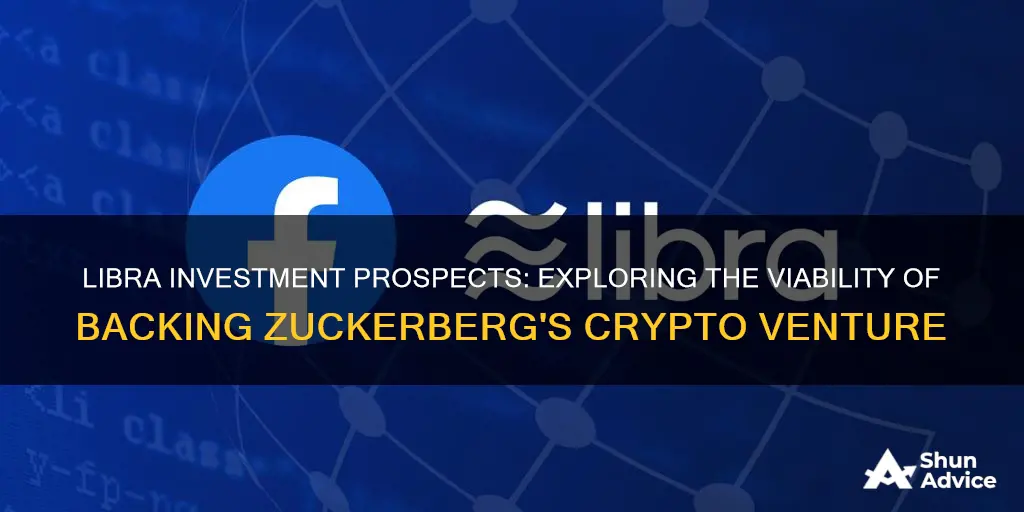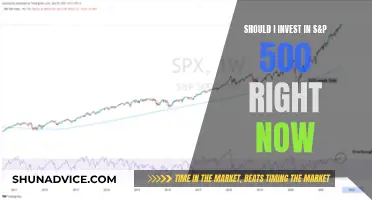
Libra is a digital currency, or cryptocurrency, created by Facebook. It is intended to be a 'stablecoin' that is pegged to a basket of global currencies, including the US dollar, the Euro, and the Yen. Facebook users will be able to send the digital coin to one another and use it to make purchases through Facebook and across the internet. Libra is not yet available, and it is unclear if it ever will be due to pushback from regulators and digital currency advocates.
What You'll Learn

Libra is a high-risk investment
Libra is designed to address the volatility and scalability issues of other cryptocurrencies, creating a unique digital currency with the intrinsic defining features of money, such as being a store of value, unit of account, and measure of value. However, it is still in the development stage and has not been officially launched yet. Facebook has faced regulatory challenges and scrutiny, leading to the Libra project being forced to rebrand to Diem.
Another concern is Facebook's track record on privacy. There are worries about how well Libra will protect its users' data. Regulators in the EU and US have raised red flags over Libra's potential risks and may block its release. There are also concerns about the use of cryptocurrencies for money laundering and financing terrorist organizations.
Furthermore, Libra is a centralized payment system, with the Diem Association responsible for ensuring the validity of the network. This goes against the decentralized nature of other cryptocurrencies like Bitcoin. While Facebook has stated that it will withdraw from the leadership role once the coin is launched, there are still concerns about the level of control that Facebook and the Diem Association will have over the currency.
In conclusion, Libra is a high-risk investment due to its potential impact on global monetary policies, regulatory challenges, privacy concerns, association with Facebook, and centralized nature.
Net Investment's Impact: Exploring Aggregate Demand Sensitivity
You may want to see also

Libra is a stablecoin pegged to a basket of global currencies
Stablecoins are cryptocurrencies that are usually pegged to government-backed currencies, such as the dollar. They aim to reduce the volatility seen in virtual currencies like Bitcoin and Ether. In Libra's case, the objective is to create a more efficient cross-border payments system.
The Libra Association, which oversees the proposed cryptocurrency, is based in Switzerland and has faced numerous setbacks since its inception. Several original member companies, including Mastercard and Visa, have withdrawn from the association. Additionally, Libra has faced fierce regulatory pushback from global authorities, who are concerned about its potential to disrupt the financial system and its possible use for money laundering or terrorist financing.
Despite these challenges, Libra may still launch as early as January, albeit in a more limited format. The "global stablecoin" will likely debut as a single coin backed 1:1 by the US dollar, with other currencies within the basket potentially being rolled out later.
Smart Ways to Invest $2000
You may want to see also

Libra is not decentralised
Libra, the new cryptocurrency launched by Facebook, is not decentralised. This is a concern for many people as it means that Libra is not accountable to the people it may affect.
Firstly, Libra is permissioned and trusted. This means that only a few entities that disclose their full identity and pay a $10 million fee can be a validating node. Having a small number of validating nodes makes the group more homogeneous and centralised. Being permissionless, on the other hand, means that the network is open to anyone without any preliminary conditions or requirements to become a node.
Secondly, Libra has a centralised governance structure. Being privately generated and governed, the verification of transactions and the governance of Libra lies in the hands of approved entities such as the Managing Director. This structure is less secure as it relies on human decision-making and emotions.
Thirdly, Libra is centralised around homogeneous elite groups. The 28 founding members of Libra, including Uber, Lyft, PayPal, Mastercard, and Visa, are elite and billion-dollar companies that can afford the $10 million requirement to run a node. This centralises the network structure around powerful people with the same interests. Decentralisation, in contrast, involves different interest groups running nodes so that power is not concentrated among one group.
Lastly, Libra has the power to freeze transactions, which enables influential groups or governments to persuade Facebook to freeze transactions and accounts.
Facebook has stated that Libra will transition from centralised to trustless and permissionless in the coming 5 years. However, as of now, Libra is centralised.
The Great Debate: Home Sweet Home or Retirement Nest Egg?
You may want to see also

Libra is not anonymous
Facebook has also created a subsidiary, Calibra, to work on the technology separately from its main social media business. In a tweet, Calibra head David Marcus wrote: "We've heard loud and clear that you don't want social and financial data commingled. We understand we will have to earn your trust."
Facebook's poor record on privacy and its dominance in social media, messaging and related businesses have sparked fears that Libra could be a threat to traditional banks, and warnings to be cautious. There are also concerns about how much personal data this will give Facebook.
One hurdle Facebook and its partners will face is the potential for criminals to use Libra for money laundering and fraud, given the pseudo-anonymous nature of Libra and other digital currencies. Facebook is sure to face an onslaught of liability concerns when it comes to anti-money laundering and identity verification.
Facebook has been dogged with questions about users' personal data, especially since the Cambridge Analytica scandal. This appears to be part of the reason Facebook created a nonprofit oversight association to govern Libra.
Facebook has also stated that it will use open-source code for Libra and its blockchain, which can be audited and monitored for bugs and flaws. It will also introduce a bug bounty system to incentivise techies to look for vulnerabilities.
Investing in Innovation: Turning Ideas into Reality
You may want to see also

Libra is not yet launched
Facebook has enlisted the financial backing of more than a dozen companies across the financial, e-commerce, tech and telecommunications industries. Credit card giants Visa, Mastercard, and ridesharing powerhouse Uber Technologies, are among the various companies that have signed up to invest around $10 million each in Libra.
However, push-back from regulators and digital currencies advocates has put into question when, and indeed if, Libra will make its public debut. Regulators in the EU and US have raised concerns and red flags over Libra's potential risks and may squash its release. Facebook has already faced intense pressure to deal with various privacy concerns, and Libra is still under scrutiny in the US and India.
Libra has been forced to reconsider its offering and rebrand to Diem. Diem is built on blockchain technology, ensuring a transparent and secure transaction history distributed across different systems. The Diem Association, which governs and develops the project, now holds the majority stake in the project. Each council member gets to elect one representative per association member.
The full system, consisting of Libra Coin and the Calibra wallet, is expected to launch next year. Presently, they are still in the final stages of development.
Student Debt vs. Stock Market: Where Should Your Money Go?
You may want to see also
Frequently asked questions
Libra is a cryptocurrency created by Facebook. It is intended to be a stablecoin that is pegged to a basket of global currencies, including the US dollar, Euro, and Yen.
The Libra Method website is currently the only platform where you can buy and trade Libra Coin outside of the U.S. You will need to register for an account, deposit a minimum of $250, and then you can start trading.
The Libra Method is an automated trading robot that is powered by a proprietary algorithm. The bot trades Libra Coin on your behalf with an alleged 90% win rate to generate profits.
Yes, investing in Libra is considered a high-risk investment. There is a possibility of losing all the money invested and there is no guarantee of protection if something goes wrong. Additionally, regulators in the EU and US have raised concerns over Libra's potential risks, which may prevent its release.
The future of Libra is uncertain. Facebook has faced regulatory scrutiny and Libra has been forced to rebrand to Diem. The coin has not been officially launched yet and is still under development.







